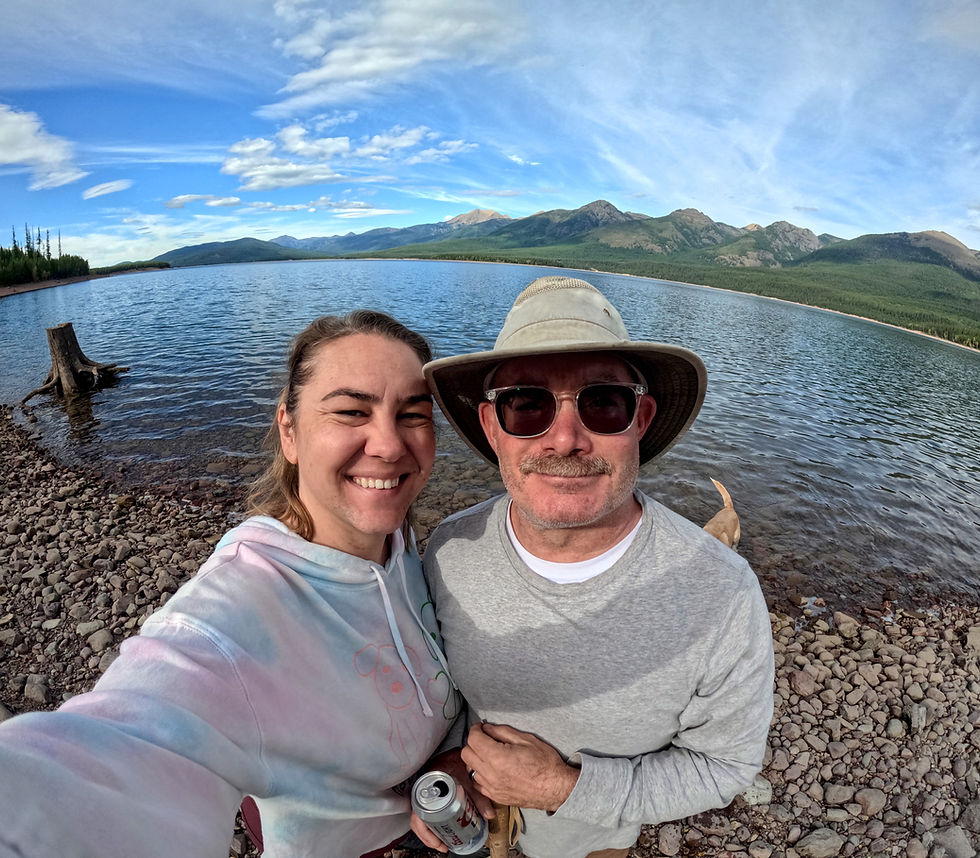How Dispersed Camping Can Help You Unplug and De-Stress: Mental Health Benefits of Getting Off the Grid
- Cara Kerouac
- Nov 5, 2024
- 4 min read
In today’s fast-paced world, it’s hard to find time to unwind. Between constant news cycles, economic worries, and everyday responsibilities, it can feel like our minds are constantly in overdrive. Dispersed camping—a form of camping in remote areas outside of designated sites—offers a unique chance to escape these stresses. This unplugged, off-the-grid experience is more than just an adventure; it’s a proven way to reset mentally and recharge emotionally.

1. The Science Behind Nature’s Healing Power

Research has repeatedly shown that nature has a profound impact on our mental health. For example, a Stanford study found that people who spent just 90 minutes walking in a natural environment showed lower activity in the region of the brain associated with rumination, which is linked to anxiety and depression. Spending time in nature has also been proven to lower cortisol levels, which helps to reduce stress and promote a sense of calm.
In dispersed camping, you’re immersed in natural surroundings without the distractions of modern life. The simplicity of a natural setting gives your brain a break from the barrage of information and stresses we face every day, allowing it to unwind, recharge, and refocus.
2. Why Dispersed Camping is Especially Beneficial
Freedom to Choose Solitude
One of the beauties of dispersed camping is that it allows you to choose your level of solitude. Unlike a busy campground, dispersed camping lets you pick a spot where you won’t be disturbed, providing a peaceful, almost meditative experience.
Unplugging Effectively
You're outside cell service in most dispersed camping areas, meaning you don’t have to worry about emails, notifications, or news updates. It’s a genuine digital detox. Research from the University of California Irvine found that being cut off from work-related email actually lowered people’s heart rates and reduced stress.

Connection to Natural Rhythms
In our dispersed camping trips, we’ve found that aligning with nature’s rhythms—waking with the sunrise, preparing meals around a campfire, and winding down as the sun sets—has a powerful effect on our mental well-being. It’s a reminder of the simpler, slower pace of life that can be hard to experience in our hyper-connected world.
3. Practical Benefits for Mental Health
Improved Focus and Clarity
Nature’s restorative impact on focus is well-documented. Studies show that people’s

attention spans and creativity improve significantly after spending time in natural settings. When dispersed camping, you’re immersed in a world without screens or structured routines, which can help your mind decompress and reset.
Physical Activity’s Role in De-Stressing
Dispersed camping often involves basic physical activities like hiking, gathering firewood, or exploring your surroundings. These activities are naturally relaxing and can reduce anxiety and improve mood. Even light exercise boosts serotonin levels, contributing to a sense of happiness and relaxation.
4. Personal Experiences: How Dispersed Camping Helped Us Unwind

On our podcast, we often talk about the peace we find through camping. One memorable trip stands out: Near Glacier National Park, we ventured deep into the national forest, surrounded by mountains, far from the nearest town. After setting up camp and just sitting by the fire, we felt the day’s stress melt away. The silence, broken only by the crackling fire and occasional rustle of trees, offered a sense of peace we couldn’t find anywhere else. Moments like these—sitting under a vast, star-filled sky or waking up to birdsong—have become essential to our mental well-being. You can listen to our experience here.
Another time, we camped at Silver Creek. The soothing sound of the flowing water became almost meditative. We felt a deep sense of connection, not only to nature but to ourselves and each other. This calm, grounded feeling stayed with us long after the trip ended.
5. Tips for a Relaxing, Stress-Free Dispersed Camping Experience
To fully enjoy the mental health benefits of dispersed camping, keep a few tips in mind:

Plan Your Time Wisely: If possible, take two to three days. The first day is often about adjusting to the slower pace, so give yourself time to settle in.
Embrace the Basics: Don’t worry about packing luxuries; let the minimalist nature of camping work for you. The simpler the experience, the more mental clarity you’ll gain.
Practice Being Present: Fully immerse yourself in nature by paying attention to sights, sounds, and smells. Tune in to sensory details, like the feel of the breeze or the scent of pine, to reduce mind-chatter and stay grounded.
6. Where to Go Next: Inspiring Destinations to Start Your Journey
For those ready to try dispersed camping, start with locations not too far from home. National forests or Bureau of Land Management (BLM) lands are excellent options, with wide-open spaces perfect for camping. If you’re interested, check out some of our podcast episodes, where we share hidden gems in specific regions, like Idaho’s Trestle Creek and Montana’s lesser-known forest sites or more popular destinations like the Grand Canyon or Yellowstone.
Some Final Thoughts

In today’s climate, finding ways to manage stress and recharge has never been more critical. Dispersed camping offers a rare opportunity to reconnect with nature, enjoy true solitude, and escape from everyday pressures. So, if you’re feeling overwhelmed or seeking a fresh perspective, consider a weekend in the wilderness. Nature is there to provide the calm, grounding reset we all need from time to time.
Let the quiet, the beauty, and the simplicity of dispersed camping remind you of life’s more profound, enduring rhythms. Unplug, unwind, and rediscover the healing power of nature.
Thank you for reading, and Happy Travels!
<3Cara
Learn more information about the Kerouacs and what their journey is all about here.

Comments